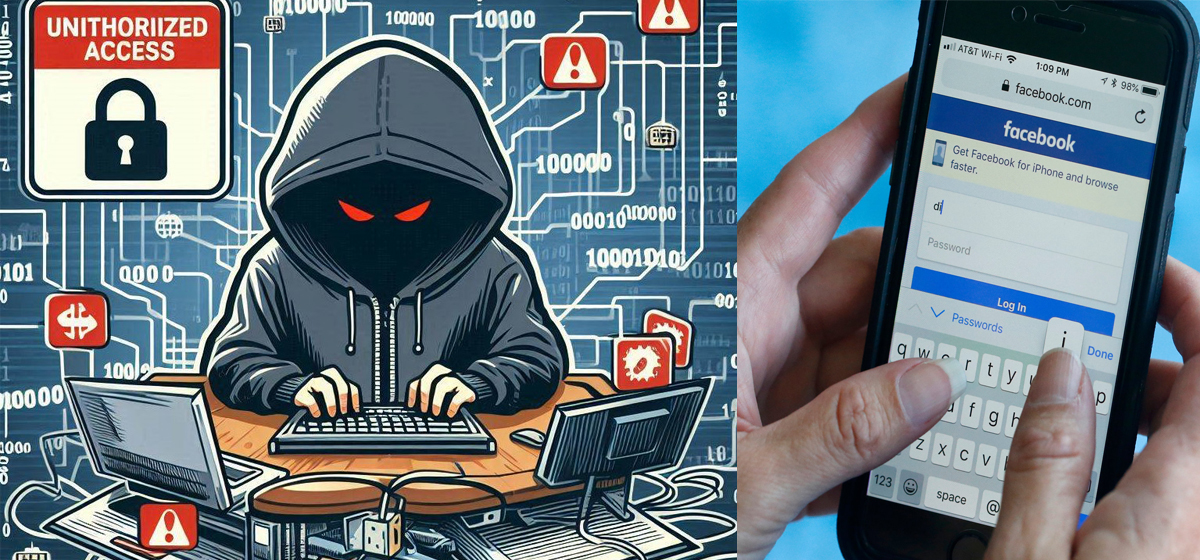KATHMANDU: Hacking, which involves unauthorized access to a Facebook account using various methods, has become a pressing global issue, including in Nepal.
Hackers can exploit Facebook to steal money from ATMs, internet banking, and SMS banking. They can also destroy or steal vital data and potentially spread viruses.
Recently, Facebook has emerged as a significant target for hackers.
According to computer engineer Uttam Karki, Facebook hacking incidents have notably increased in Nepal.
The rise in searches for hacking methods on Google, including WiFi and Facebook hacks, suggests a growing concern.
Karki, who has been working in the IT sector for a decade, observes that hacking incidents in Nepal have become more frequent, mirroring trends in developed countries. Many of these incidents have coincided with election periods.
Statistics from the Cyber Bureau over the past four years reveal that 16,000 complaints related to cybercrime have been filed, with 4,700 specifically related to Facebook hacking. Most victims fall within the 20 to 45-year age range.
He questions the allocation of resources: “Which areas will the staff focus on—cybercrime, social crime, or Facebook-related issues? Are they also managing the Messenger app?”
Cyber Bureau spokesperson Superintendent of Police Deepak Awasthi notes that highly active social media users, including professionals such as businessmen, bankers, artists, politicians, and journalists, are particularly vulnerable to hacking.
He also highlights that hackers create fake profiles, pages, and use impersonation tactics to damage reputations.
On the other hand, engineer Karki identifies four primary methods used for Facebook hacking:
Phishing: This involves creating a fake Facebook page to trick users into entering their credentials.
The fake page appears similar to the real Facebook site, misleading users into providing their login information.
Key Logging: Hackers use keylogging software to capture saved login credentials from various devices.
If Facebook login information is saved on a mobile device or laptop, it can be exploited by hackers.
Social Engineering: This method involves guessing passwords based on popular events or personal information.
For example, if your password is related to your mobile number or a festival, hackers might use such clues to guess it.
Session Hijacking: Hackers predict passwords based on recent changes or emotional states.
For instance, if you recently changed your password or profile picture, hackers might use this information to guess your new password.
To protect yourself from Facebook hacking, he suggests vigilance about online security practices.
Avoid sharing sensitive information, and use strong and unique passwords, and be cautious of suspicious links and messages.
What does the Cyber Bureau do?
When a hacking incident occurs, many people start by filing a complaint with the Cyber Bureau.
According to spokesperson Superintendent Awasthi, individuals will receive a token number upon submitting their complaint.
Awasthi explains, “Facebook is not registered in Nepal and has no servers here; the nearest server is in Singapore. This geographical distance can slow down communication and recovery processes.”
He adds that the increase in hacking incidents has led to slower response times from Facebook. “Replies typically take a week or 10 days,” he notes.
Engineer Karki highlights that delays are worsened by the need to coordinate with foreign servers and a shortage of police personnel.
He questions the allocation of resources: “Which areas will the staff focus on—cybercrime, social crime, or Facebook-related issues? Are they also managing the Messenger app?”
Karki advocates for increasing staff to address cybercrime more effectively and suggests that users should take proactive measures to protect themselves.
He also calls for government action to combat electronic crime.
How should users protect themselves from hacking?
- Exercise caution when sending messages to strangers on Facebook.
- Avoid opening messages from unknown senders without verifying their authenticity.
- Do not accept friend requests from unfamiliar individuals.
- Perform regular security audits of your accounts.
- Avoid logging in to Facebook from unfamiliar or suspicious sources.
- Change your password periodically.
- Enable two-factor authentication on your mobile device, which sends notifications to both your phone and email.
- Verify the legitimacy of websites before entering personal details.
What should the government do?
- Develop and implement laws related to information technology and cybercrime promptly. Clearly define legal boundaries and permissible actions.
- Create a reporting mechanism through the Ministry of Communication for citizens to report cybercrimes.
- Promote ethical hacking by establishing a department to handle abuse and defamation cases.
- Collaborate with technical companies to enhance cybersecurity measures.
- Launch education and public awareness programs to inform citizens about online safety.









Comment